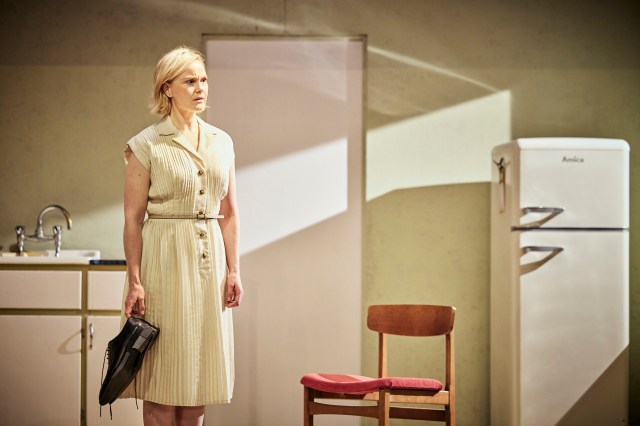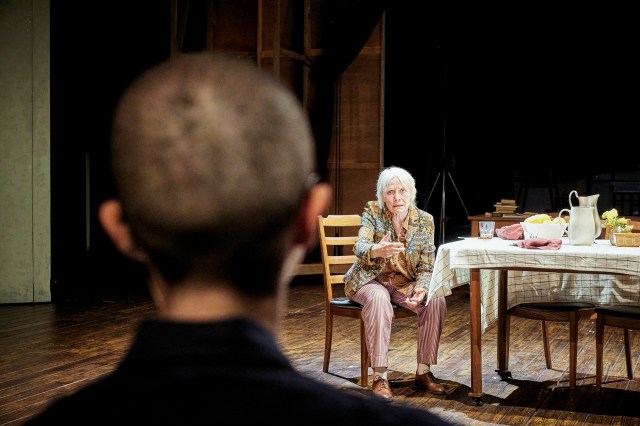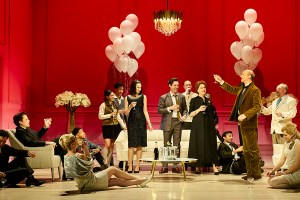The Confessions at the National Theatre – review
Alexander Zeldin’s production runs until 4 November in London before continuing its European tour into spring 2024

It opens with a woman standing in front of a faded burgundy curtain, sharing her memories. “I’m not interesting,” she declares. “I’m an old lady. What’s so interesting about me?” Then she draws back the curtain to reveal another stage, slotted within the frame of the real one. She vanishes through another burgundy curtain and a young woman in a lemon sherbet dress steps out, shivering with excitement, on the threshold of her life.
It’s a striking beginning to a wonderful, compassionate play. Alexander Zeldin’s The Confessions literally puts a woman centre stage and then, with care and understanding, lets her tell the story of her life.
In his previous work, including The Inequalities Trilogy, Zeldin has turned his empathetic but unblinking eye on people struggling with the effects of poverty. Here the story is much more personal. It’s based on conversations he had with his own mother and a character called Leander – scrappy, angry, questioning – makes an appearance.
As the story of Alice unfolds from Australia in the late 1950s to the UK somewhere near the present day, his trademark style emerges. Zeldin makes unmissable, original theatre, both unflinching and kind, both consciously unreal and utterly naturalistic. The result is another story of immense feeling, contained in a controlled frame.
Alice is played by two actresses: Amelda Brown is the older woman, looking back on her past, watching her experiences with steady understanding and an occasional twinge of sadness. Eryn Jean Norvill takes on her younger self, moving from uncertainty to a more knowing maturity. Yet the parts are indivisible: when the young Alice is attacked, it is Brown who enacts her attempt to find salvation.

The theme that emerges is one of choice: Alice is always trying to carve out options for herself, even when society closes them for her. Her gentleness combined with her sense of wanting to make something of herself, is constantly striving against a world that treats her harshly.
The trajectory of her struggle is marked in a series of swift scenes that take place within the confines of Marg Horwell’s deliberately stagey set – a kitchen on a truck that is turned by stagehands to become different spaces. The lighting by Paule Constable is stark, flat, lifelike. Half the time the house lights are up. When a terrible thing happens to Alice behind a door, off-stage, the audience is plunged into darkness and silence. We sit, complicit, unable to intervene.
The tension of that scene, just at the point when Alice seems to be in control of her life, is overwhelming. Zeldin, as director as well as writer, makes Alice’s fate of the utmost importance, eliciting a heartbreaking sense of involvement. We witness her academic aspirations being crushed by her own lack of confidence and her mother’s desire she should marry; we encounter her controlling first husband with his insistence on her submission; we see her fledgling freedom quashed by the liberal hippies who are supposed to encourage it.
When she finds love and happiness – stepping forward to snatch it with both hands – it is once again dashed. Yet through it all, she remains quietly determined, wrenching a choice from a life that seems to close it away from her. Her journey is utterly engrossing – a justification of the Simone de Beauvoir quote read aloud at an embarrassing dinner party. “My life would be a beautiful story that would become true, bit by bit, as I told it to myself.”
In this touring production, mounted by the Alexander Zeldin company, each actor plays many parts. They do so with conviction, each taking roles that seem to repeat characteristics, making a pattern of behaviours: Pamela Rabe is exceptional both as Alice’s mother and the feminist guru, the first all cringing submission on the surface, resolute beneath, the second sweeping individual rights aside in her own self-belief; Joe Bannister takes on two unbearable men, a damaged husband and a swaggering lecturer; Brian Lipson is both Alice’s supportive father and her final love; Gabrielle Scawthorn is an irritating but loving friend. Music by Yannis Philippakis binds the shifting moods with unobtrusive understanding.
The entire endeavour serves as a reminder of just how extraordinary an ordinary life can be but also of the magical story-telling nature of theatre itself, the way it can take one person’s experience and forge it into a tale for the ages, a collective fable of self-realisation and hope.



















